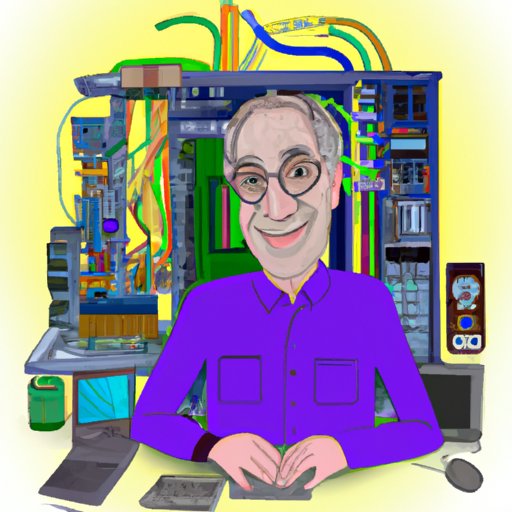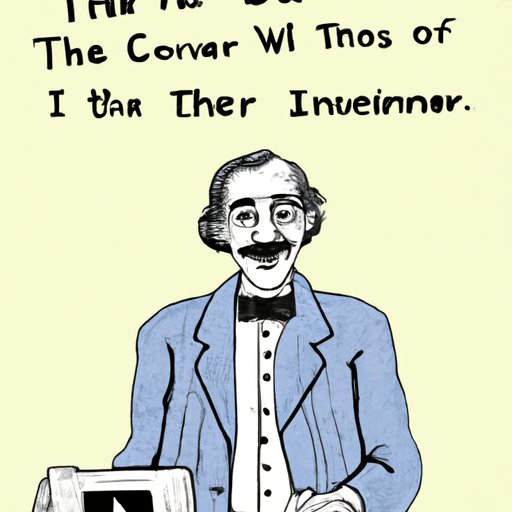Introduction
The invention of the computer has revolutionized the way we work, play and interact with each other. But who invented the computer? While it’s impossible to pinpoint a single individual who can be credited with the invention of the computer, there are a number of pioneers who made significant contributions to its development. In this article, we’ll explore the history of the invention of the computer, from its early days in the 19th century to its modern-day incarnations.
A Historical Look at the Inventor of the Computer
The development of the computer began in the early 19th century with the work of Charles Babbage. His design for the Analytical Engine was the first step towards the development of an automated computing machine. Although Babbage never completed his design, he laid the groundwork for future generations of computer engineers.
In the 1930s, German engineer Konrad Zuse developed the Z1 Computer, an electromechanical machine that used binary code and could solve basic mathematical problems. The Z1 was the first programmable computer, and set the stage for further advances in computer technology.
John Atanasoff is credited with the invention of the Atanasoff-Berry Computer (ABC), the first electronic digital computer. Completed in 1942, the ABC was capable of performing basic mathematical calculations and relied on vacuum tubes for its operation. It was the first successful example of an electronic digital computer.

A Biography of the Creator of the Computer
Alan Turing is widely considered to be the creator of the computer. Born in 1912 in London, England, Turing was a brilliant mathematician and codebreaker. He studied mathematics at King’s College, Cambridge, where he developed the concept of the Universal Turing Machine, a theoretical device capable of computing any computable problem.
In 1936, Turing wrote a paper entitled “On Computable Numbers, with an Application to the Entscheidungsproblem” which proposed a universal machine capable of computing any mathematical problem. This was the first description of a general-purpose computer, and it provided the foundation for modern-day computers.
Turing went on to develop the Bombe, a machine that was used to decipher coded messages sent by the Germans during World War II. He was also responsible for developing the Automatic Computing Engine (ACE), a precursor to the modern-day computer.
Turing was awarded an Order of the British Empire for his contributions to the war effort, but tragically died in 1954 after ingesting cyanide. He was posthumously pardoned in 2013 for his conviction of “gross indecency” in 1952 and awarded the Presidential Medal of Freedom in 2016.

The Man Behind the Machine: The Inventor of the Computer
Although Alan Turing is widely recognized as the creator of the computer, there were many other pioneers whose contributions helped shape the development of the computer. Among them are J. Presper Eckert and John Mauchly, who designed and built the Electronic Numerical Integrator and Computer (ENIAC) in 1946. ENIAC was the first large-scale electronic general-purpose computer.
William Shockley, John Bardeen and Walter Brattain are credited with the invention of the transistor in 1947, which allowed computers to become smaller and faster. Gordon Moore and Robert Noyce developed the integrated circuit in 1959, paving the way for the miniaturization of computers.
Finally, Steve Wozniak and Steve Jobs are credited with creating the first personal computer, the Apple I, in 1976. This marked the beginning of the era of personal computers, which revolutionized the way people interact with technology.

How the Invention of the Computer Changed the World
The invention of the computer has had a profound impact on businesses, education and society as a whole. Businesses have been able to automate processes, streamline operations and increase efficiency. Education has been transformed, with students now able to access vast amounts of information instantly through the internet. And society has been changed in countless ways, from online shopping to social media.
Exploring the Pioneering Minds Who Created the Computer
It’s impossible to overstate the impact that the invention of the computer has had on the world. From Charles Babbage to Alan Turing and beyond, these pioneering minds have shaped the course of history. Let’s take a look at some of the key figures who have made significant contributions to the development of the computer.
J. Presper Eckert and John Mauchly are credited with designing and building the world’s first large-scale electronic general-purpose computer, the Electronic Numerical Integrator and Computer (ENIAC). William Shockley, John Bardeen and Walter Brattain are credited with inventing the transistor in 1947, while Gordon Moore and Robert Noyce developed the integrated circuit in 1959.
Steve Wozniak and Steve Jobs are credited with creating the first personal computer, the Apple I, in 1976. This marked the beginning of the era of personal computers, which revolutionized the way people interact with technology.
A Timeline of Computer Innovation: Tracking the History of the Inventor of the Computer
The history of the computer stretches back centuries, but the modern-day computer was developed in the 20th and 21st centuries. Here is a timeline of the major milestones in the development of the computer.
Pre-20th Century Computers
- 1623 – Wilhelm Schickard develops the first mechanical calculator
- 1822 – Charles Babbage designs the Analytical Engine, a mechanical calculator capable of solving equations
20th Century Computers
- 1936 – Alan Turing proposes the concept of a universal machine capable of computing any mathematical problem
- 1946 – J. Presper Eckert and John Mauchly build the Electronic Numerical Integrator and Computer (ENIAC)
- 1947 – William Shockley, John Bardeen and Walter Brattain invent the transistor
- 1959 – Gordon Moore and Robert Noyce develop the integrated circuit
- 1976 – Steve Wozniak and Steve Jobs create the Apple I, the first personal computer
21st Century Computers
- 2000 – Sony introduces the PlayStation 2, the first video game console to use a 3D graphics processor
- 2007 – Apple releases the iPhone, the first smartphone with a multi-touch display
- 2011 – Microsoft releases Windows 8, the first version of Windows to feature a touch-based user interface
Conclusion
The invention of the computer has changed the world in countless ways, from business to education to society as a whole. While it’s impossible to pinpoint a single individual who can be credited with the invention of the computer, there are a number of pioneers who made significant contributions to its development. From Charles Babbage to Alan Turing and beyond, these pioneering minds have shaped the course of history.
(Note: Is this article not meeting your expectations? Do you have knowledge or insights to share? Unlock new opportunities and expand your reach by joining our authors team. Click Registration to join us and share your expertise with our readers.)
